 Petzlover
Petzlover Bull Terrier Miniature is originated from United Kingdom but Chiweenie is originated from United States. Both Bull Terrier Miniature and Chiweenie are having almost same height. Both Bull Terrier Miniature and Chiweenie are having almost same weight. Both Bull Terrier Miniature and Chiweenie has almost same life span. Bull Terrier Miniature may have more litter size than Chiweenie. Bull Terrier Miniature requires Low Maintenance. But Chiweenie requires High Maintenance
Bull Terrier Miniature is originated from United Kingdom but Chiweenie is originated from United States. Both Bull Terrier Miniature and Chiweenie are having almost same height. Both Bull Terrier Miniature and Chiweenie are having almost same weight. Both Bull Terrier Miniature and Chiweenie has almost same life span. Bull Terrier Miniature may have more litter size than Chiweenie. Bull Terrier Miniature requires Low Maintenance. But Chiweenie requires High Maintenance
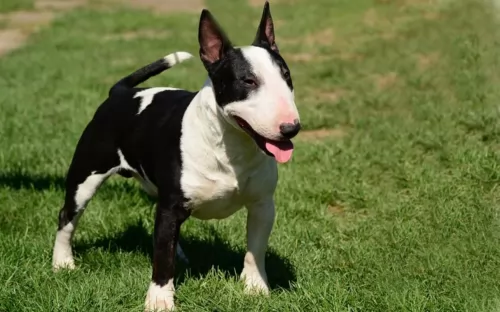 Less well known than the Bull Terrier, the Miniature Bull Terrier which actually follows the same breed standard, has a height of 35cm. The Bull Terrier and Miniature are classified as the same breed. The weight of the smaller Miniature is only about 15kg.
Less well known than the Bull Terrier, the Miniature Bull Terrier which actually follows the same breed standard, has a height of 35cm. The Bull Terrier and Miniature are classified as the same breed. The weight of the smaller Miniature is only about 15kg.
It was in the early 1800s that the Miniature Bull Terrier was developed, descending from the English Bulldog as well as the White English Terrier which is now extinct. This blend produced the Bull and Terrier, which was later shortened to the Bull Terrier. They came in a number of colors such as pure white, white and tan as well as white-and-black-patched or tri-colored.
Breed fanciers wanted a compact dog which looked much the same as the larger Bull Terrier. It was in 1938 that Colonel Glyn founded the Miniature Bull Terrier Club in England and the Miniature Bull Terrier Club of America was formed in 1966.
 The Chiweenie is a small dog developed in the 1960’s as a hybrid/cross between the Dachshund and the Chihuahua. Due to their small size and big personalities, they are an extremely popular designer breed. They are easy to care for and their personality and activity level is much like the Chihuahua side of the hybrid. The Chiweenie can look like either of its parents if it is first generation. If it is second or third generation it is likely to resemble the parents more as they already look like one of the two breeds. The second and third generations will look like the mix more than either of the originators.
The Chiweenie is a small dog developed in the 1960’s as a hybrid/cross between the Dachshund and the Chihuahua. Due to their small size and big personalities, they are an extremely popular designer breed. They are easy to care for and their personality and activity level is much like the Chihuahua side of the hybrid. The Chiweenie can look like either of its parents if it is first generation. If it is second or third generation it is likely to resemble the parents more as they already look like one of the two breeds. The second and third generations will look like the mix more than either of the originators.
The Chihuahua is the smallest breed of dog in the world and they originated in Mexico. The Daschund is a hunting dog from Germany with a long body and short legs. The Chiweenie is a nice looking cross breed that loves people and is very affectionate. They were developed in the United States.
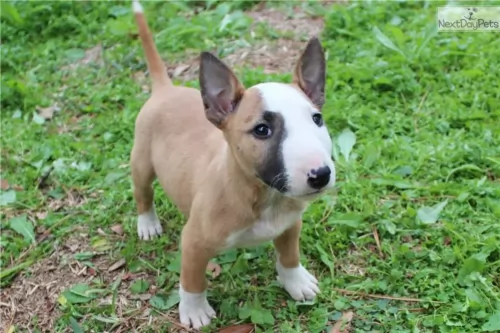 Miniature Bull Terriers, just like the regular Bull Terriers have short, glossy coats and these coats can be white, tan, brindle or tri-color such as black, tan and white. This is a muscular little dog, with the same very distinctive egg-shaped head and small, closely-set dark eyes and erect ears. The medium length tail is carried horizontally.
Miniature Bull Terriers, just like the regular Bull Terriers have short, glossy coats and these coats can be white, tan, brindle or tri-color such as black, tan and white. This is a muscular little dog, with the same very distinctive egg-shaped head and small, closely-set dark eyes and erect ears. The medium length tail is carried horizontally.
The Miniature Bull Terrier isn’t particularly good with small children, but he still makes a good companion for people, whether he lives in the city or the country. In fact, this smaller breed Bull Terrier makes a great pet for people with smaller spaces, and like the Bull Terrier, he is a loving, devoted pet. He has an entertaining personality, is playful and energetic, making him a good watch dog.
However, even though he is small, he is always more than ready to take on any larger pets and therefore isn’t considered the greatest pet to have if you have other animals in the house. However, with excellent training and socialization, this handicap can be overcome.
 A first-generation Chiweenie can look like either of the breeds they are crossed with. However, the second and third generations will have the hybrid look for the most part. No two will look exactly alike however. They have a thin snout that is long on a small, domed head. They can have floppy or pointed ears, eyes that are large and expressive, a moderate tail and small feet. They can vary substantially in their appearances.
A first-generation Chiweenie can look like either of the breeds they are crossed with. However, the second and third generations will have the hybrid look for the most part. No two will look exactly alike however. They have a thin snout that is long on a small, domed head. They can have floppy or pointed ears, eyes that are large and expressive, a moderate tail and small feet. They can vary substantially in their appearances.
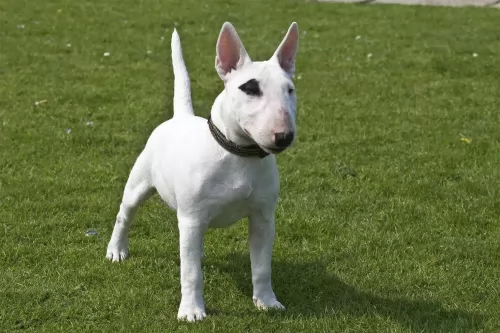 The attractive Miniature Bull Terrier is just a small version of the regular Bull Terrier, and many people are drawn to them because they have all the spunk of the larger breed but are easier to manage. He is such an entertaining little dog and guarantees to make an excellent family companion. He is just longing to be involved in every family activity happening around him.
The attractive Miniature Bull Terrier is just a small version of the regular Bull Terrier, and many people are drawn to them because they have all the spunk of the larger breed but are easier to manage. He is such an entertaining little dog and guarantees to make an excellent family companion. He is just longing to be involved in every family activity happening around him.
He becomes attached to his human family, but this deep bond between him and his family can lead to separation anxiety. Never leave him alone day after day in the backyard. You wouldn’t to that to one of your children, and he is a family member, albeit a 4-legged one.
Just like the standard Bull Terrier, the Miniature Bull Terrier is going to need firm training from a young age. Then he becomes an exceptional pet as he understand the boundaries in your particular home.
 This is an extremely popular hybrid or designer dog because they are so friendly, gentle, loving lapdogs. In addition, they love to play and cuddle. They are great for single or older people. If they live with a family it should be with older kids because younger kids might hurt them. Be careful how rough you play. They are small and can be hurt easily.
This is an extremely popular hybrid or designer dog because they are so friendly, gentle, loving lapdogs. In addition, they love to play and cuddle. They are great for single or older people. If they live with a family it should be with older kids because younger kids might hurt them. Be careful how rough you play. They are small and can be hurt easily.
The Chiweenie is dedicated to their people and extremely loyal. They are also very cautious and can be nervous. They are always watching what else is happening in their environment and they will bark to alert you if they think there is something or someone out of place. They are not quiet dogs. They are great with other small dogs that they are raised with or used to but not with larger dogs, cats or other animals. They are jealous and protective. Train them out of or to avoid resource guarding. They can be stubborn about these things.
They will play constantly if you let them and they are great travel companions, although noises and activity around them does often annoy them. They are also courageous, clever, lovable and happy. Like most toy or small dog breeds you might have a difficult time housebreaking them and crate training is recommended.
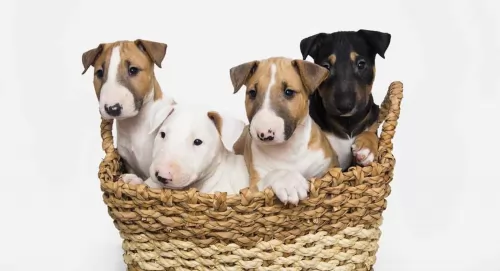 The Miniature Bull Terrier can live to be 10 to 12 years of age. Their most serious health issue is blindness which is caused by lens dislocation, showing up more or less after 3 years of age. With the white dogs, other breed health concerns can include congenital deafness and compulsive tail chasing.
The Miniature Bull Terrier can live to be 10 to 12 years of age. Their most serious health issue is blindness which is caused by lens dislocation, showing up more or less after 3 years of age. With the white dogs, other breed health concerns can include congenital deafness and compulsive tail chasing.
Some Bull Terriers develop a compulsive neurologic disorder where the dog turns round and round chasing his tail. As soon as you see this, try and distract him with an exciting game, because allowed to develop, it’s a habit that can become difficult to control.
This is a common problem with dogs and you need to watch that tartar build-up on the teeth which can lead to infection of the gums. Brush your pet’s teeth with special dog toothpaste and toothbrush 2 or 3 times a week so that he doesn’t lose any teeth. Bad teeth can affect other organs such as the kidneys and heart.
 Chiweenies are a pretty healthy crossbreed with their most prominent issue being allergies. At the same time this hybrid might inherit any of the problems of either of their two parental breeds. These conditions might include:
Chiweenies are a pretty healthy crossbreed with their most prominent issue being allergies. At the same time this hybrid might inherit any of the problems of either of their two parental breeds. These conditions might include:
The tendency for this would come from the Chihuahua parental genes and can result in brain damage but normally is not that bad.
The tendency for this would come from the Dachshund parental genes and if your Chiweenie has a long back you will need to be careful of jump and overzealous playing.
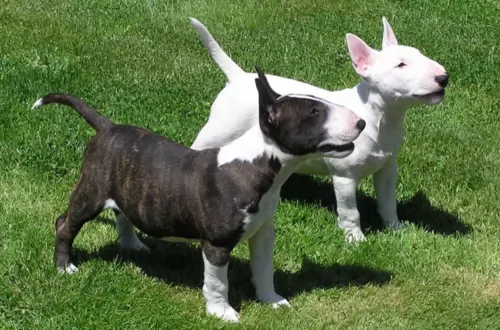 With his short, smooth coat, the Miniature Bull Terriers requires little grooming. He’ll need a good brush down twice a week to remove loose hairs.
With his short, smooth coat, the Miniature Bull Terriers requires little grooming. He’ll need a good brush down twice a week to remove loose hairs.
This is one of the best things you can do for your Bull Terrier if you don’t want them having puppies. Spaying or neutering decreases the likelihood of certain types of cancers too.
Keep your dog’s diet consistent, varying between a top quality commercial produced dog food appropriate to his age. You can include home-made meat, vegetables and rice and some raw meat every now and then. Never feed him human-food such as peanuts, crisps and chocolate. Always have fresh, cool water available night and day.
 Chiweenies regulate their own food intake, even as puppies. They should be fed twice a day and they are prone to dental issues. Dry food is absolutely recommended.
Chiweenies regulate their own food intake, even as puppies. They should be fed twice a day and they are prone to dental issues. Dry food is absolutely recommended.
In addition to the conditions listed above, the Chiweenie might inherit the issues that affect small dogs most often. This includes:
A sudden drop in blood sugar levels. This can happen if the dog has diabetes and it is unregulated or stress and poor nutrition can also cause it.
These are little dogs with a lot of energy and they burn up a lot of energy. They need to walk every day or have a full-blown play session in the house. They don’t need much space to play in.